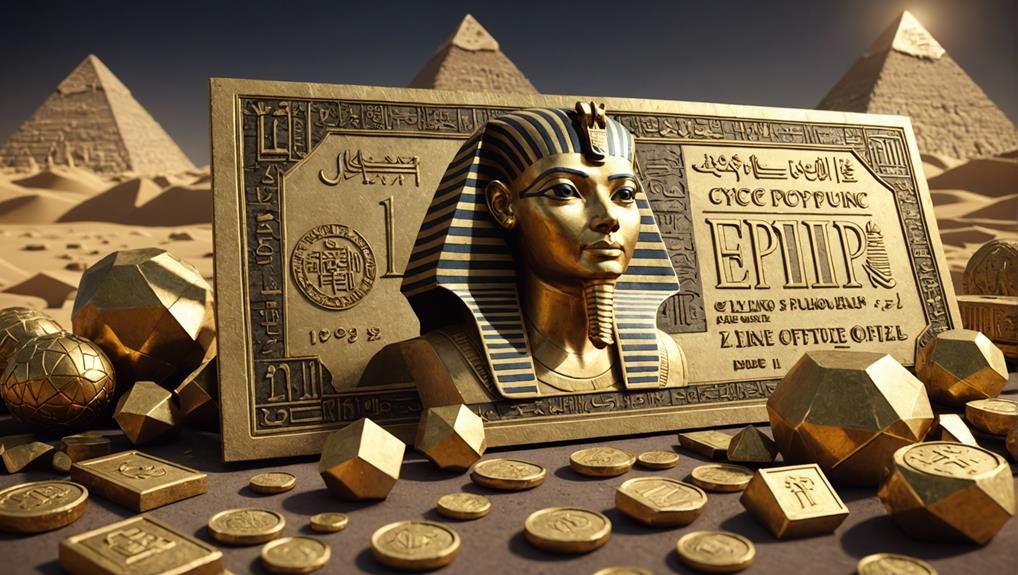Egyptian Pound (EGP): Definition as Currency of Egypt and Trade
The Egyptian Pound (EGP) is the official currency of Egypt, replacing the Egyptian piastre in a historical transformation dating back to 1834. It is governed by the Central Bank of Egypt, influencing monetary policies to maintain stability and economic growth. EGP's value impacts trade balances, foreign investments, and inflation management in Egypt. Efficient currency management, exchange rates like 21.47 EGP to 1 British pound, and strategies to hedge against fluctuations are crucial for international trade. The EGP's future outlook is positive, backed by solid performance projections and market analysis, shaped by Central Bank policies and global economic dynamics.
Key Takeaways
- EGP is official currency of Egypt, designated by ISO 4217.
- Originated in 1834 to replace Egyptian piastre.
- Managed by Central Bank of Egypt for stability and growth.
- Influences trade balances, foreign investments, and economic diversification.
- Exchange rates fluctuate, impacting import/export costs.
Historical Background of Egyptian Pound
The development of the Egyptian Pound (EGP) through its historical background showcases a transformation from its inception in 1834 to its current status as the official currency of Egypt as designated by ISO 4217.
Initially introduced to replace the Egyptian piastre, the EGP's origins lie in a currency design evolution that has seen significant changes over time. From being backed by precious metals to moving to a managed float in 2001 and eventually to a free float in 2016, the Egyptian Pound has undergone notable shifts in its structure and valuation mechanisms.
The evolution of the currency's design reflects the changing economic landscape and monetary policies that have shaped Egypt's financial system.
Central Bank's Role in EGP
Playing a pivotal role in shaping the Egyptian Pound's trajectory, the Central Bank of Egypt exerts significant influence over the currency's stability and performance. As the primary monetary authority in Egypt, the Central Bank plays an essential role in the economy by overseeing the country's monetary policy.
Through its monetary policy decisions, such as setting interest rates and managing the money supply, the Central Bank influences inflation, economic growth, and exchange rates. Its interventions in the foreign exchange market also impact the EGP's value relative to other currencies.
The Central Bank's ability to regulate the money supply and implement policies to achieve price stability and sustainable economic growth underscores its importance in maintaining the EGP's stability and supporting Egypt's overall economic health.
Impact of EGP on Egypt's Economy
Pivotal in shaping Egypt's economic landscape, the impact of the Egyptian Pound (EGP) on the country's overall economic performance is profound and far-reaching. The management of inflation is a critical aspect influenced by the EGP's value fluctuations.
Economic diversification efforts are also intricately tied to the EGP, as it affects the competitiveness of various sectors in the economy. The currency's stability or volatility can have a profound impact on Egypt's ability to attract foreign investments and manage trade balances.
In recent years, the Central Bank's decisions regarding the EGP have played a vital role in steering the economy through challenges such as inflation spikes and external shocks. Moving forward, maintaining a balanced approach towards managing the EGP will be essential for sustaining economic growth and stability.
Currency Conversion and Exchange Rates
Efficient management of currency conversion and exchange rates is essential for facilitating international trade and financial transactions in the Egyptian economy.
- EGP Exchange Methods:
- Physical conversion at exchange counters or banks.
- Mathematical conversion: Multiply EGP by 0.064 for USD.
- Currency Fluctuations:
- Exchange rates: 21.47 EGP = 1 British pound, 18.44 EGP = 1 euro (as of Sept. 20, 2021).
Fluctuations impact import/export costs.
Consider hedging strategies to mitigate risks.
Future Outlook for Egyptian Pound
When examining the future outlook for the Egyptian Pound (EGP), it is important to take into account the currency's recent performance and potential factors influencing its trajectory.
The EGP has shown resilience and strength against its counterparts, particularly gaining ground against the dollar in 2020 and 2021. Market analysis suggests that the Egyptian Pound is expected to maintain stability moving forward, with Fitch Ratings supporting this projection.
Expected trends indicate that the EGP will continue to demonstrate solid performance, backed by the country's efforts to bolster its economic foundations. Factors such as the Central Bank of Egypt's policies, economic diversification, and global market dynamics will play a pivotal role in shaping the future path of the Egyptian Pound.
Conclusion
To sum up, the Egyptian Pound (EGP) stands as a resilient currency in Egypt's economy, shaped by historical transformations and central bank control. Despite initial devaluation post free float, the EGP has exhibited stability and potential for growth.
Like the Nile River flowing steadily through time, the EGP navigates economic currents with adaptability and strength, symbolizing Egypt's enduring financial foundation.







